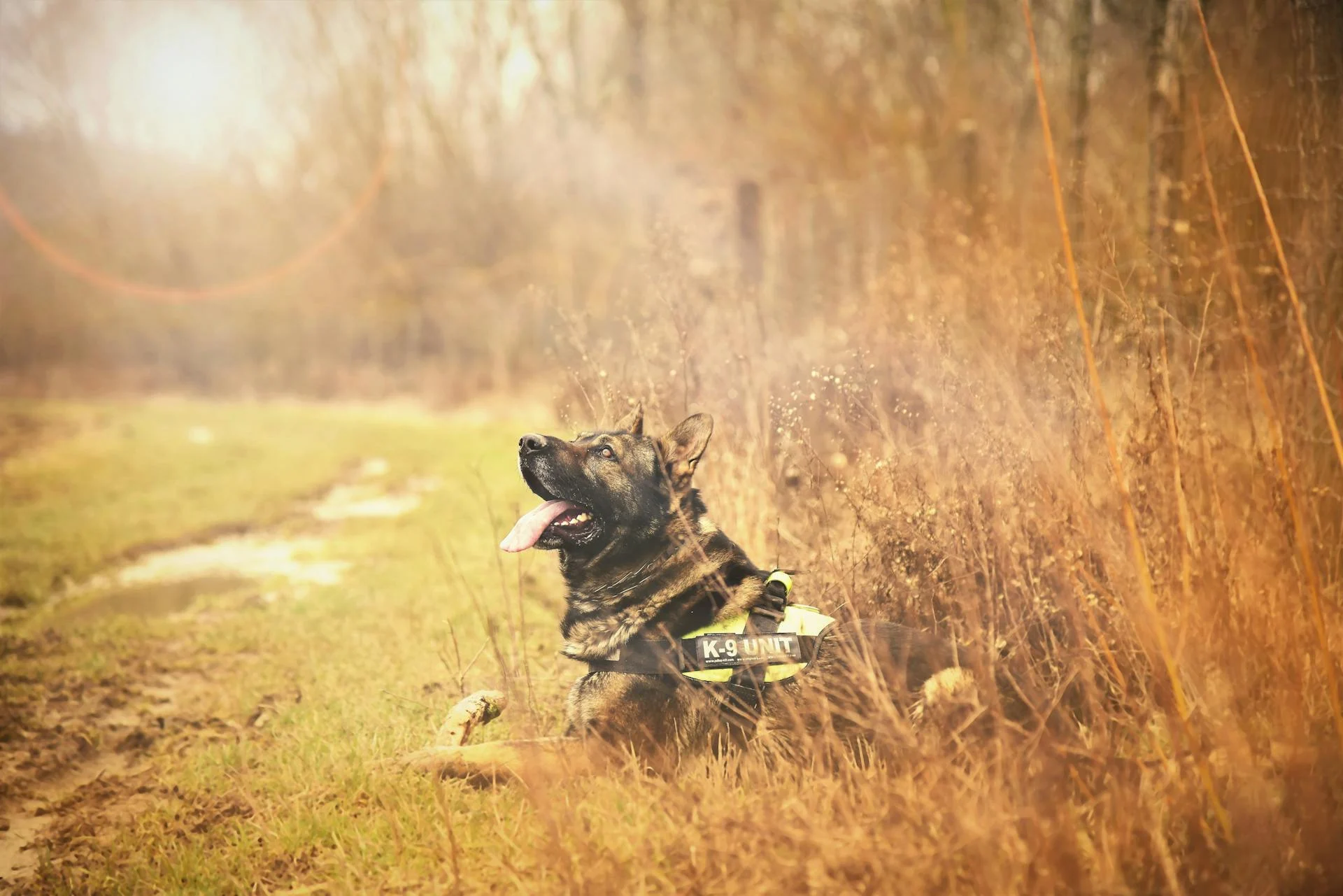
Fostering a German Shepherd dog can be a life-changing experience, but it's essential to understand the responsibilities involved. German Shepherds are highly intelligent dogs that thrive on structure and mental stimulation.
They require a minimum of 1-2 hours of exercise and training per day, which can be a significant commitment for some families. German Shepherds are naturally protective of their families, but with proper socialization and training, they can become gentle and loving companions.
German Shepherds are generally healthy dogs, but they can be prone to certain health issues such as hip dysplasia and digestive problems. Regular veterinary check-ups and a balanced diet can help prevent or manage these issues.
With patience, love, and proper care, German Shepherd dogs can live up to 9-13 years, providing a loyal companion for many years to come.
Recommended read: Dog Training in German Language
Why Foster a German Shepherd?
Fostering a German Shepherd can be a life-changing experience, especially if you're looking for a loyal companion. German Shepherds are highly intelligent, ranking 3rd in Stanley Coren's book "The Intelligence of Dogs" for working and obedience intelligence.
They thrive on mental and physical stimulation, which makes them perfect for active families or individuals who enjoy outdoor activities. German Shepherds need at least 30 minutes of exercise per day to stay happy and healthy.
Their high energy level also makes them excel in dog sports like agility and obedience training. In fact, German Shepherds are often used as search and rescue dogs due to their keen sense of smell and athleticism.
With proper training and socialization, German Shepherds can grow into confident and calm companions. They're naturally protective of their families, but they can also be wary of strangers, making them great watchdogs.
By fostering a German Shepherd, you'll not only be giving a loving home to a deserving dog, but you'll also be gaining a loyal friend who will be by your side through thick and thin.
Preparing for a Foster Dog
Before bringing a foster dog home, it's essential to ensure your own dogs are up to date on their vaccinations, including rabies, distemper, parvo, and other common diseases. Make sure they're also vaccinated against kennel cough.
You'll need to prepare your home by puppy-proofing it, as the new dog will likely behave like a puppy at first. This means securing any loose items, electrical cords, and toxic substances out of reach.
To keep your foster dog safe, it's recommended to crate-train them. GSRNC will provide you with a crate if you don't have one, and you should set it up with easily cleanable bedding. If you don't have a crate, designate a small, dog-safe room for the dog to stay in when you can't supervise.
Before Committing to a Rescue Dog
Before committing to a rescue dog, you need to be sure that fostering a German Shepherd Dog is a good fit with your lifestyle, schedule, and home/family obligations.
You should consider whether all members of your family are fond of and experienced with the German Shepherd Dog breed. It's also essential to think about whether they're okay with having a big dog that sheds and needs attention in your home.
You might enjoy: Are German Shepherd Dogs Good Family Dogs
Fostering a rescue dog requires time and enthusiasm to spend exercising and working with a dog that may be in need of basic training, housebreaking, and socialization. You should also have the space to accommodate a foster dog, possibly separate from your own pets.
Serendipity GSD Rescue foster coordinators will be happy to explain their group's policies and procedures, including the adoption process and what will be expected of you. You'll also be required to sign a foster contract that outlines the responsibilities of both the rescue organization and the foster family.
It's crucial to consider whether you have the time and resources to devote to a foster dog, as well as the potential for behavioral issues or personality problems with your own pets.
On a similar theme: Fostering Military Dogs
Home Requirements
To prepare your home for a foster dog, you'll need to puppy-proof it. Secure any loose items that could be a choking hazard or cause damage.
A safe space is essential for a foster dog to feel calm and relaxed. Create a quiet room with a comfortable bed and familiar scents, such as a blanket or toy from the shelter.
Your home should be free from hazards, including toxic substances and electrical cords. Move any toxic substances to high shelves or secure them in a locked cabinet.
A foster dog will need regular exercise to stay happy and healthy. If you have a yard, make sure it's securely fenced to prevent escape.
Make sure all family members are on the same page about the foster dog's needs and rules. This will help create a stable and loving environment.
Fostering Process
Fostering a German Shepherd through GSR is a rewarding experience that allows you to help a dog in need.
You must be in the Chicagoland area to foster for GSR, and be willing to travel to one of their veterinary partners in Deerfield, Elgin, Sycamore, Libertyville, Hanover Park, Glencoe, or Naperville.
GSR supplies a leash, collar, name tag, food, crate, and covers all medical care during the foster period.
If a dog is facing challenges adjusting in their foster home, GSR works with several dog trainers throughout the Chicagoland area to provide support.
Foster homes can specialize in behavioral or medical cases, or simply provide a temporary home for a dog until it's adopted.
About German Shepherd Rescue
Fostering a German Shepherd dog through a rescue organization is a rewarding way to help these amazing animals in need.
By fostering a German Shepherd dog, you'll receive support from a well-established group, including supplies and equipment.
You'll also have access to behavioral and training information to help you care for the dog.
A foster coordinator will be available to answer any questions and help if issues arise.
If you can't keep a foster dog, it's good to know there's someone out there who can take the dog back, either permanently or temporarily.
Responsibilities and Requirements
As a foster for a German Shepherd dog, you'll need to provide basic care such as food, water, shelter, grooming, and exercise. This includes providing your own leash, collar, bowl, and toys for the dog.
You'll also need to give your foster dog his own space to rest and relax, which is why crate training is so important. In fact, the organization will even provide a crate for you to use, along with instructions on how to properly use it.
In terms of veterinary care, the organization will cover the costs of authorized vet visits, but you'll need to make arrangements through your foster coordinator. You can also expect to provide some basic training, such as housetraining and teaching basic manners like walking on a leash and coming when called.
Here are some specific responsibilities you'll need to consider:
By taking on these responsibilities, you'll be giving a German Shepherd dog a second chance at a happy and healthy life.
Apply to Be Home

To apply to be a foster home for a German Shepherd, you'll need to download and complete the Foster Home application from the German Shepherd Resource & Rescue Center, Inc.
The application can be returned to them through various methods, and you can expect a call from them ASAP.
You can start the foster home application process by emailing [email protected] with GSRNC.
The organization provides all food for the foster dog, as well as authorized veterinary care.
Obedience Training opportunities are also available at no cost to you and your foster dog.
You'll receive support and aid for any questions or behavior problems you might encounter with your foster dog.
A crate will be loaned to you for the foster dog, and you'll be encouraged to use it for crate training.
By fostering a German Shepherd, you'll be giving a dog another chance to find a loving, safe home.
Adoption Requirements
To adopt a German Shepherd from a rescue organization, you'll need to meet certain requirements.
You must be at least 21 years old and have the consent of all household members to adopt.
The Chicagoland area is the primary location for adoption, although other areas may be considered on a case-by-case basis.
If you rent your home, you'll need to provide proof of permission from your landlord to have a German Shepherd.
A home inspection by a representative from the rescue organization is also required.
Before committing to adopting a German Shepherd, you should consider whether your family and lifestyle are a good match for the breed.
This includes thinking about whether everyone in your household is fond of and experienced with German Shepherds, and whether you have the time and energy to care for a dog that sheds and needs attention.
A foster contract will be required, outlining the responsibilities of both the rescue organization and the adoptive family.
How to Find Permanent Homes for My Dog
Finding a permanent home for your dog can be a challenging but rewarding experience. SGSDR posts a page on Petfinder.com with photos and a few paragraphs about your foster dog, which is often where we get most of our adopters from.
You can also help by putting up posters at local veterinarians' offices, pet supply stores, community bulletin boards, dog parks, and dog training clubs. Some dogs will only be with you for a few days, while others will stay for months, so be patient.
All adopters of SGSDR program dogs are screened before meeting your foster dog. We ask for references from their current or past vet, as well as personal references who can vouch for the applicant's suitability as a dog owner. We also look for applicants who have a suitable home, yard, and family life most suitable to the particular dog they're interested in.
We make sure past or other pets in the home are current on vaccinations, heartworm testing and preventive, and are neutered or spayed. If there are any concerns we cannot rectify, we decline the application.
Requirements
To be eligible to foster a German Shepherd Dog, you must live in one of the six New England States. You also need written permission from your landlord, roommates, and/or condo or homeowners associations.

You'll want to ensure your home is safe for the dog, so we prefer a securely fenced yard area for their safety. If you don't have a fenced area, you'll still be eligible to foster GSDs not requiring a fenced in area, on a case-by-case basis.
If you have your own dogs, they must be well socialized, and if you have children living in your household or visiting more than once every six months, they must be at least 10 years old.
Here are the specific requirements in detail:
- Live in one of the six New England States
- Have written permission from your landlord, roommates, and/or condo or homeowners associations
- Have a securely fenced yard area (or be eligible for alternative arrangements)
- Have well socialized dogs (if you have any)
- Have children aged 10 years or older (if you have any)
These requirements are in place to ensure the safety and well-being of both you and the dog. By understanding and meeting these requirements, you'll be well on your way to providing a loving and stable home for your foster dog.
Frequently Asked Questions
Why do so many German Shepherds end up in shelters?
Many German Shepherds end up in shelters due to owners moving and being unable to find suitable housing. Stray German Shepherds also frequently arrive at shelters, making up the majority of intakes.
Do dogs get attached to foster parents?
Yes, dogs can quickly form attachments to their foster parents, but the nature of this attachment depends on the behavior of both the dog and the foster volunteer. Understanding this dynamic can help foster parents build strong bonds with their canine companions.
Are German Shepherds hard dogs to own?
Yes, German Shepherds can be challenging to own due to their strong working instincts and high energy levels. However, with proper training and care, they can make loving and loyal family pets.
How do I give my German Shepherd away?
Reach out to multiple German Shepherd rescues and all-breed rescues to find a suitable new home for your dog, and ask for referrals if they can't take your dog in themselves
Featured Images: pexels.com


